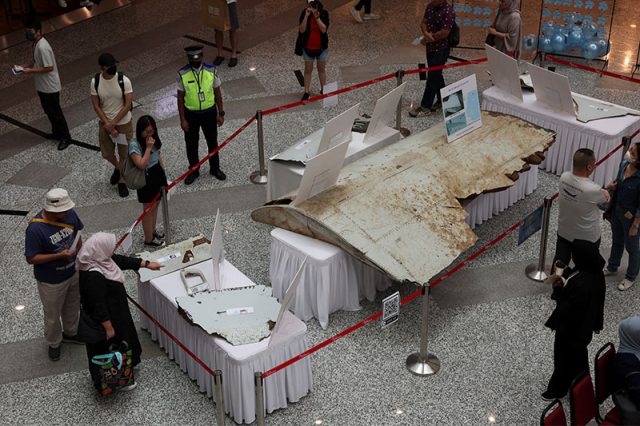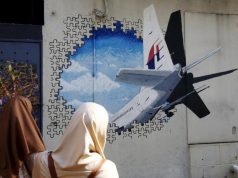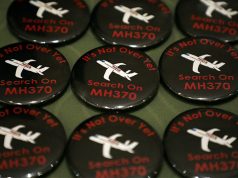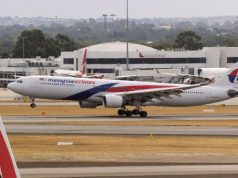
The disappearance 10 years ago of Malaysia Airlines flight MH370 with 239 people on board remains one of the world’s greatest aviation mysteries.
The Boeing 777 went missing on its way from Kuala Lumpur to Beijing on March 8, 2014.
Satellite data analysis showed the plane likely crashed somewhere in the southern Indian Ocean, off the coast of western Australia. However, two major searches failed to come up with any significant findings.
Here are some details of the search for MH370 and the unresolved mystery of what happened:
WHAT IS KNOWN?
The last transmission from the plane was about 40 minutes after it took off from Kuala Lumpur for Beijing.
Captain Zaharie Ahmad Shah signed off with “Good night, Malaysian three seven zero”, as the plane entered Vietnamese air space.
Shortly thereafter, its transponder was turned off, which meant it could not be easily tracked.
Military radar showed the plane left its flight path to fly back over northern Malaysia and Penang island, and then out into the Andaman Sea towards the tip of the Indonesian island of Sumatra. It then turned south and all contact was lost.
UNDERWATER SEARCHES
Malaysia, Australia and China launched an underwater search in a 120,000 sq km (46,332 sq miles) area in the southern Indian Ocean, based on data of automatic connections between an Inmarsat satellite and the plane.
The search, which cost about A$200 million ($143 million), was called off after two years in January 2017 with no traces of the plane found.
In 2018, Malaysia accepted a “no-cure, no-fee” offer from U.S. exploration firm Ocean Infinity for a three-month search, meaning the company would only get paid if it found the plane.
That search covered 112,000 sq km (43,243 square miles) north of the original target area and also proved fruitless, ending in May 2018.
DEBRIS
More than 30 pieces of suspected aircraft debris have been collected along the along the coast of Africa and on islands in the Indian Ocean, but only three wing fragments were confirmed to be from MH370.
Most of the debris were used in drift pattern analysis in the hopes of narrowing down the aircraft’s possible location.
INVESTIGATION REPORT
A 495-page report into MH370’s disappearance, published in July 2018, said the Boeing 777’s controls were likely deliberately manipulated to take it off course, but investigators could not determine who was responsible.
The report also highlighted mistakes made by the Kuala Lumpur and Ho Chi Minh City air traffic control centers and issued recommendations to avoid a repeat incident.
Investigators stopped short of offering any conclusions about what happened to MH370, saying that depended on finding the plane’s wreckage.
CONSPIRACY THEORIES
The inability to locate MH370’s crash site has fuelled numerous conspiracy theories, ranging from mechanical error or a remote-controlled crash, to more bizarre explanations like alien abduction and a Russian plot.
In recent years, some aviation experts have said the most likely explanation was that the plane was deliberately taken off course by an experienced pilot. Investigators, however, have said there was nothing suspicious in the background, financial affairs, training and mental health of both the captain and co-pilot.
RESUMPTION OF SEARCH
Malaysia’s transport minister announced on Friday the government had agreed in principle to resume the search for the wreckage following a new proposal from Ocean Infinity, which would receive $70 million if substantive wreckage is found.
The new search, once a contract is signed, would expand the previous search area by 15,000 sq km, the minister said. The contract would cover 18 months and the firm had indicated the best time for the search would be between January and April.
(Reporting by Rozanna Latiff and Ashley Tang; Editing by Martin Petty and Raju Gopalakrishnan)








